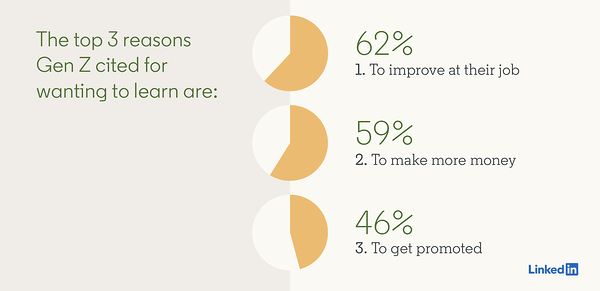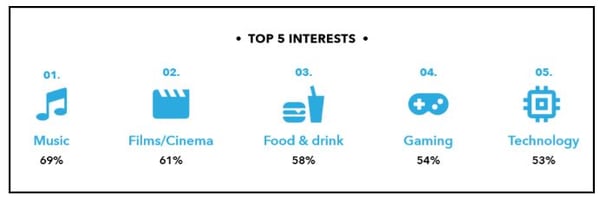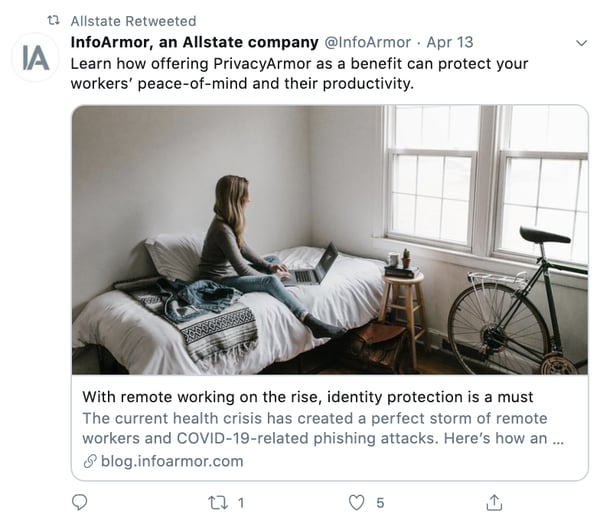With a purchasing power of more than $143 billion, Gen Z is expected to shake up the retail industry.
Although many in Gen Z are earning their first paychecks, entering college, or just joining the workforce, studies already show that the generation shops and spends money much differently than its millennial predecessor.
For example, while millennials enjoy primarily shopping online, Gen Z -- an age group which is even more connected to technology -- surprisingly prefers shopping in stores. Additionally, while millennials and past generations were more loyal to brands, Gen Z is more interested in buying products that will give them the best value based on their price.
Why is Gen Z so budget-conscious?
Why is Gen Z so conscientious about their spending habits? Mounting research suggests that the age groups' thoughts on money link directly to the economic era they were raised in.
While millennials grew up in more stable financial times, most of Gen Z's earliest memories took place during the U.S. recession. Much of this generation grew up in highly budgeted households or saw how their families were impacted by economic troubles.
Meanwhile, a large percentage of millennials, as well as those in other age groups. are able to recollect times where their economy was booming. Organizations including the Pew Research Center say these eras have psychologically molded how each generation thinks differently about money. While researchers believe both millennials and Gen Z are money conscious, with goals of avoiding financial instability, millennials are considered to be "more optimistic" future finances.
As Gen Z ages, studies and purchasing behaviors hint that they haven't been able to shake their concerns of financial instability. Much research shows that to get Gen Z to invest in a product or service, the offering needs to be so valuable to them that they can justify purchasing it.
In recent years, data about Gen Z's purchasing habits have concerned many brands and marketers, especially those that rely on frills and brand loyalty to sell their products. Many have also asked, "If Gen Z is focused on saving money, what will they actually buy?"
Luckily, there's plenty of data that reveals which products are most valuable to Gen Z. This data can help marketers learn more about Gen Z's purchasing motives and execute on campaigns that better acknowledge how their products can be valuable to those in the age group.
To help brands market to Gen Z when they reach full purchasing power, here’s a list of five items, services, or product categories you can expect them to invest in.
5 Things Gen Z Will Spend Money On
1. Gen Z will spend money on education.
While millennials are one of the most highly educated age groups, Gen Z is on track to have the best level of education. At this point, Gen Z's already been shown to start saving for college at a much younger age than millennials.
As members of the generation enroll in college or begin to spend their own money, news outlets have predicted and reported bursts in school-related purchases fueled by Gen Z shoppers.
Aside from purchasing supplies, Gen Z is also likely to invest in courses or educational programs that will advance their future earnings. In fact, while 62% of Gen Z will take classes or learn new skills if it makes them better at their job, 59% will do the same if it will boost their salary.

In fact, due to the rising costs of college, most of Gen Z has deprioritized non-essential purchases just to save money for academic investments.
Gen Z's interest in saving money and frugal purchasing behaviors aren't that shocking. One recent study projects that three-quarters of Gen Z will have student loans at graduation. More than 60% of the age group is also expected to have college debt beyond $25,000.
Ultimately, many researchers believe that Gen Z's interest in academia is rooted in their need for financial stability. Many in the age group believe that a good education will lead to a great job with high pay.
As a marketer, it's important to keep Gen Z's budgeting and educational goals in mind. This generation wants to learn new things, is saving for college, and prioritizes investments that better their future. You'll need to convince them that your product is worth buying -- even when they're putting most of their money into a college fund.
As you create your product promotions or campaigns, consider how your product could help or benefit the experiences of someone planning for college, college students, or young professionals.
If your product isn't specifically geared towards education, your campaigns could zone in on how it could improve a college or work-life experience. For example, if you're marketing furniture, you could create a promotion that highlights products that would fit in an apartment or dorm room. Or, if you market a clothing company, you could highlight clothing items that could be worn in a job interview in a blog post on your website.
Aside from creating content that directly links your product to career interests or academics, you can also lean into Gen Z's need to learn new things by developing educational content that teaches audiences about your industry. After viewing your educational content, audiences might want to learn more about your product and develop a stronger sense of trust for your brand. Later, if they're interested in buying a product related to your brand's industry, they might consider your brand first.
If you want to leverage educational content, keep the age range of your audience in mind. While younger members of Gen Z might be primarily interested in B2C brand content due to their college or high-school age, Gen Zers entering internships or the workforce might value educational B2B content that can show them how to get ahead in their industry.
2. Gen Z will splurge on experiences.
Despite being linked to heavy social media use, researchers say most of Gen Z likes to take breaks from social media and screens from time to time.
In a recent study, 95% of Gen Z participants under 24 admitted to feeling stressed "somewhat often" or "very often." Participants then pointed to online activity, homework, and finances as triggers that have caused physical or emotional signs of stress.
To ease stress, many participants of the study said they took breaks from screen time, read books, or left their home to find in-person experiences.
According to Snap Inc. and GlobalWebIndex, Gen Z is actually more intrigued by experiences than millennials. For example, Gen Z is more likely to view local art and try out adventure or extreme sports activities than millennials. Below are just a few of Gen Z's top overall interests, according to the study:

While Gen Z values products and services that will benefit their future and help them navigate major pain points, they also still like to budget time and money for experiences such as dining out, local excursions, or occasional travel.
Although Gen Z will invest in something that will offer them positive life experience, you should still keep the age group's budget conscientiousness in mind if you're marketing something to them. Because they care about cost and value, Gen Z members might heavily research a restaurant, excursion, or travel service before spending money on it.
If you're a brand that sells excursion or in-person experiences, simply placing a few colorful stock photos on your website might not pull in Gen Z. You might have to take a step further by including detailed information about your offerings, highlighting positive reviews, and even launching a blog that provides more information and demonstrates your credibility.
If your brand sells physical items rather than excursions, consider creating messaging that highlights how your products can improve or boost an experience.
For example, if you sell coffee, you could create an ad showing a tired young adult energizing themselves with a sip of coffee before a day of adventuring in the wilderness. Or, if you sell clothing, your ads could highlight how they're perfect for outings like vacations or nice dinners out. Regardless of the product, tell a story about an experience Gen Z is interested in and then explain how your product can help them.
3. Gen Z prioritizes essential products, services, and utilities.
Like millennials, life experiences and education matter to Gen Z. However, as a frugal generation, the age group still wants to make sure they have enough money for essential products such as food, health products, and home supplies.
Putting essential budgeting first was a clear theme that Vice discovered when its journalists interviewed a handful of Gen Z members about their lifestyle and purchasing habits. Almost all of the participants explained that they would invest more in essential products rather than buying products related to fun, entertainment, fashion, or fan loyalty.
If your brand sells essential products, like food, cleaning supplies, or medication, there are two things you'll want to do.
First, create marketing content that acknowledges and reminds Gen Z audiences of why your products are so essential and worth budgeting for.
Second, keep in mind that even if your products are essential, Gen Zers might still research them, read the box before making a purchase, or compare them to other items in the same aisle. Because many brands make essential products, you'll want to create messaging that notes why your product is more effective or a better bargain than all the other versions of it out there.
If your brand doesn't sell an essential product, it's even more important to create marketing materials that establish a need for your product, how it can help customers solve for daily pain points, and why it's worth a Gen Z member's hard-earned money. Remember that Gen Z's first purchasing priority might not be your product, then think of ways you can still grab their attention anyways.
Not sure how to establish a sense of need when your product isn't essential? Below is an example of content from InfoArmor, an information security service owned by Allstate. In the recent tweet, InfoArmor shared a blog post about the dangers of information security when working remotely and how InfoArmor could protect remote employee information.

When reading the tweet or the blog post attached to it, a person in Gen Z or any age group might identify where they might run into information security risks and might consider purchasing the product to keep their information safe.
On average, Gen Z spends more than four hours per day online, which trumps past generations -- including millennials. As the most hyper-connected generation that's existed so far, it's not shocking to think that Gen Z will spend money on technology. However, because they're financially conscious, many in the age group will prioritize buying the most essential or useful technologies. For example, nearly 100% of Gen Z own a smartphone, 70% own a computer, and 30% own a tablet.
Gen Z will invest in technology.
Aside from technological essentials, Gen Z will occasionally splurge on technological experiences that help them have fun, such as video games. In fact, a 2019 study found that two-thirds of Gen Z men say gaming is a "core component" of who they are.
While you might worry that Gen Z isn't worth marketing to because they won't splurge on your products, this age group certainly can be persuaded to make larger purchases that offer fun experiences or improve their daily lives.
But, even though they will invest in higher-priced products, Gen Z will still need thorough convincing before pulling out their wallets. As noted above, it's incredibly important for brands targeting Gen Z to create content that demonstrates why the age group needs their product, how the product could solve daily boredom or woes, and why it's better than a competitor's.
For example, although some consumers might consider Fitbit fitness trackers frivolous, this brand does a great job of explaining why their product can be a necessary tool to use within a fitness routine.
On social media, Fitbit gives facts about why walking and cardio -- two activities the bracelet can track -- are important to health. And, in a November blog post, Fitbit more deeply connected its product to health needs by discussing how its reporting software could help people communicate better with their doctors.
While Fitbit doesn't claim its product is necessary for health, the brand shows audiences how the product can be used to help them track their fitness needs and progress.
When a pessimistic or budget-conscious Gen-Z member researches Fitbit, they might find its content informative and helpful. From there, if they're interested in a healthier lifestyle, they might realize that Fitbit is a credible brand that could help them with their fitness needs.
Gen Z prefers to buy low-priced clothing.
A recent Business Insider report revealed that Gen Z isn't easily persuaded by a logo when it comes to clothing. In fact, unlike other generations, brand loyalty is one of the last things they think about when making a purchasing decision. What the generation does focus on is price and value.
In the Business Insider report, a 20-year-old named Amanda Chermin explained, "I can't afford nicer brands of clothes -- I like to save and would rather have money in the bank than be broke."
Instead of splurging on the hottest brand from New York Fashion Week, the age group, which also prefers to shop in stores, is more likely to purchase cheaper clothing that's either not from a name brand, on clearance, or re-sold.
Although they aren't loyal to the same stores and brands millennials zoned in on, Gen Z still feels pressure to buy and wear clothing that's considered good quality or fashionable. Aside from purchasing affordable clothing, the need to look their best has also led to many in Gen Z to invest in clothing rental services or try-before-you-buy shopping experiences.
Although Gen Z is expected to spend less money on clothing than other generations, researchers believe they still feel pressure to look good in front of their peers. These pressures, which might stem from social media, school, work, or social environments will still drive the age group to clothing stores or ecommerce sites. While retail marketers should expect shifts in spending behaviors from this generation, Gen Z will still buy clothing that looks good on them, is good quality, and has an affordable price.
The themes related to clothing purchases are important to keep in mind -- even if you aren't marketing clothing products. As we've established, Gen Zers are always looking for a good bargain and won't use just a brand name to justify a purchase. Regardless of how popular or well-known your brand is, you'll still need to highlight why your products are better than cheaper versions from competitors.
Although your logo might not persuade Gen Z to buy your product, you can still use authentic brand trust and popularity to your advantage. Although Gen Z is budget-conscious, they also care about what their peers think of them. This means that they might still feel a need to splurge on a product, such as a clothing item, if they know that people in their age group have it.
If you're marketing to Gen Z, consider asking popular influencers or happy young adult customers to discuss your product on social media. An authentic product review will not only build a sense of brand trust, but it will also show Gen Z audiences that the product is popular and being used by people they follow. From there, a Gen Z member might research or purchase a product simply because it's more popular or has better reviews than a cheaper alternative.
How to Market to a Money-Conscious Generation
Based on research noted above, Gen Z is less likely to splurge on frivolous products or brand names. As a marketer, hearing about these mounting studies might make you nervous.
But, in the long run, the consumer trend of putting value first shouldn't scare or shock you. In fact, it should motivate you to ask, “How can I provide better value to my customers?”
Although Gen Z might seem more budget-conscious, this doesn’t mean they won’t buy anything from you at all. In fact, many of your most frugal prospects will still buy, invest in, or splurge on your brand's offerings if they seem valuable, help them solve pain points, or provide a positive, memorable experience.
Ultimately, bettering your brand, focusing on the customer experience, and promoting positive company reviews will go a long way with Gen Z and all other audiences.
Interested in learning more about Gen Z? Check out these stats pieces on their demographics and their workforce aspirations. You can also read more about their online content consumption habits her
If you’re looking to learn about both Gen Z and millennials, check out this comparison piece.
